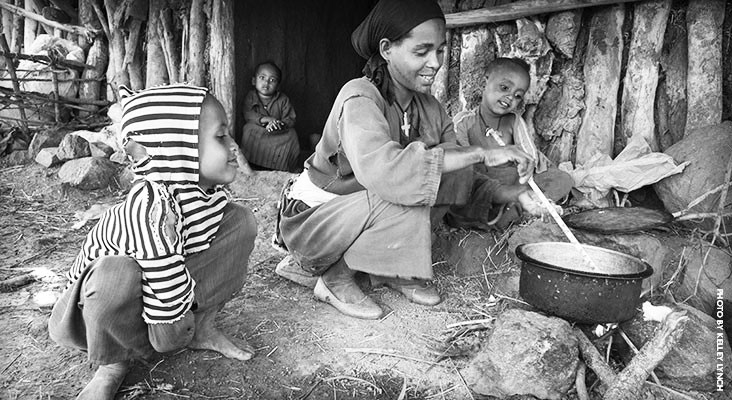
We are all born of a father and a mother. The phrase ‘the mother land implies’ the true love of the country like the love and kind heartedness amother has for her child. Without the matrimonial union of the husband and wife, there is no other way for the birth of a child to happen. Even though a father, due to cultural precept, is given the title as the head of the family, without the participation of the mother, the whole issue virtually loses its essence. Being a female parent, in fact, the mother, lays a firm foundation for the continuity of the stability of a familyand the generation as she predicates the responsibility or the duty of the family by virtue of producing a child which herself and her husband equally claim the ownership. On top the nine months painful and tiresome pregnancy period and the excruciating pains of delivery stillthe greater responsibility of rearingthe child fully falls on the mother alone. It does not mean that the father has no share in the whole process.
A mother is considered patient and resilient in facing hardship and difficulties during her married life. She has the quality of quickly recovering from crushing experience unlike her husband.She is often, after the incidence, even if it is harmful,she still becomes buoyant in her disposition. The very quality required to shoulder the heavy tasks of the household.Coupled with what she does for the benefit of her child, she is also engaged in the food preparation, cleaning and laundering clothes for the members of household-things that are not done by the male partner in Africa, more soin Ethiopia. In Ethiopia, the husband is considered, until recent years, as the bread earner of the family. He is responsible for making money to purchase food and clothing for his children and for the family as a whole. If he is a farmer, he makes it his bounden duty to till the land to produce food, buying other utensils by the money he earns from the sale of the surplus agricultural product.
It is the responsibility of the mother to properly manage the money provided by her husband for the household expenses. Her husband, after having done his part keeps clean hands for the food the mother puts on the table, without even caring to know the troubles she has been through in the process of the preparation; he simply embarks on the eating without appreciation. On the other hand, she expresses her love for her husband by the delicious food she prepares to wet his appetite and at the same time expectinga reciprocating appreciation from him as sheer indication of the magnitude of his love for her. Abreast of this, it is her desire
to make sure that her child is well fed to grow healthier and stronger. When her husband realizes her efforts to make her family protected both physically and emotionally, he draws closer to her more than ever. This circumstance proves the mother to be a binding chord for sustainability of the marriage.An authentic mother, seasoned by kindness, devotes her self to the wellbeing her child and to the family at large. She spends her time, energy and interest for the sake of her beloved husband and child. As a general rule, she devotes her whole being to the welfare of the family. She is up to creating conditions of good health and comfortable living, by feeding them a balanced diet and cheerful disposition. This view is based solely on Ethiopian context, which has its own unique characteristic,and which the mother cherishes for her family.She tenderly cares for those she believes are undoubtedly her own. She keeps alive feelings, hope and conditionsin an effort to fuel love to prevail under any circumstance whatsoever. A sane husband echoes the sentiment.To him, she is the taste of chocolate and chocolate is the taste of independence from the suppressed love in Africa.
Juxtaposed with this, there are nominal mothers whose intention is to gain appreciation without fulfilling the precepts of mother-hood. The rule or the guide that she has to fulfill is little exhibited in her.The writer observed such a mother while walking in the street with her two or three year old child was dragging the baby and when the baby fails to keep pace, it fumbles and stumbles, she vigorously snatches him by the arm barking at him, can’t you see? For the sake of justice, who is blind? Her loud shout scared the baby and made him cry; her irrational fury escalates even more. Lack of compassion is not an inherent quality of a true mother. A true mother is noted for her pity for the suffering of her innocent baby. The mother who is least concerned for the safety of her child is not worth calling a mother. Such mothers do not take time to understand their children why they behave likethey do. Obviously, a child is innocent and does not know what to do when affected by circumstances. He is at the mercy of his mother and she should understand him better and do what is necessary to appease his sorrow, anger or discomfort. She should know the three conditions that make a child cry: hunger, illness and being wet. Such things, a bad mother does not realize its importance and neither is she willing to understand.
Yet, the blessed and the edifying status of the mother is lowered to the level of servitude. In many other African countries, a mother, rather than being an object of affection, is only demanded to produce bountiful crop of children, who can help in the fields and can eventually take care of their parents in old age. This particular situation reduces her human value to machine. The role of an African woman, a person whose physical and spiritual strength is nothing short of being commended, should be accorded special attention. In the rural areas, as it is obviously noted, the mother is uneducated, barefoot and stoopshouldered. Her comforts are few, her burdens many. According to the United Nations, the African woman produces 70 percent of the food grown on the continent. She works harder and longer hours into the night and has more responsibilities than her husband. She is the economic backbone of the rural community, themaker of family’s decisions, the initiator of social change, the harvester of crops. She is the hub around which the spokes of the society turn. Walking down almost any country road you will see a procession of women padding along the shoulder, their back parallel to the ground under the weight of huge piles of firewood or jar of water. The outdoor marketplaces, the most important source of economic activity in any village, are run and staffed exclusively by mothers (women) like in Gurage land. On top of the household tasks, in the fields, it is only women you see with hoes and sickles.
How about the men? The elderly ones are apt to be sitting in the shades of trees, drinking tella (homemade beer), discussing their cattle. The younger ones are either in the school, in the city or in the local beer hall. Daughters, the future mothers, are more important to African parents. African mothers feel frustrated that they remain second-class citizens despite their contributions to family and the community. Lately, except few who have escaped through instrumentally of education, mostly in the rural, are expected to remain sexually faithful, while their spouses are permitted, even expected to have as many wives and girlfriends as they can support. This, of course, differs from culture to culture. The writer, during his post graduate studies in Kenya, was told by one of his university batch, that the husband can come home in the evening with a strange woman; calls the wife to meet her new friend and the children their new mama. The hope, the womantries to prove herself a genuine mother to her child and faithful wife to the husband shatters at this point. The value of the mother that is capable of sustaining the marriage vanishes. The bright light of love wanes, the mother becomes just a woman of servitude. What a pity!!
The Ethiopian Herald July 24, 2020
BY JOSEPH SOBOKA




